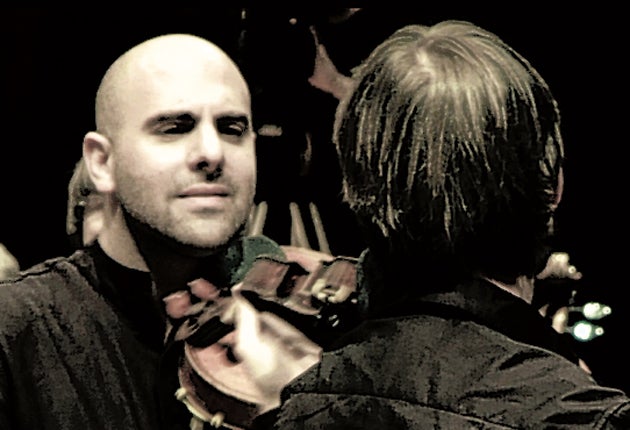Douglas Gordon, Gagosian Britannia Street, London

Have you ever fallen in love with a piece of orchestral music? I got involved in a piece recently. I listened to it every day, over and over. I sent it to friends to listen to over the internet: no one shared my feelings! I had it in my head all the time. I wondered, as I walked down the street, violins blazing in my brain, whether I could actually replay all of it in my imagination – or was I just hearing the main tune? The arrangement has so many layers and movements – they're so particular to me now. I can't even begin to explain it with my words as tools.
Watching Douglas Gordon's latest film installation at Gagosian, we find he, too, is deeply involved in a piece of music: Mozart's Sinfonia Concertante in E Flat (also known as Köchel Composition K364, the code-like title that gives Gordon's film its title). The experience of entering the main gallery is disorienting – several mirrors around the entrance to the main space give a false sense of space. On two large angled screens one sees two films playing together in a kind of symphony: depicting a journey of two musicians – Avri Levitan and Roi Shiloah – as they travel from Berlin to Warsaw for a performance of K364 in which they will play the central melodic parts, for a violin and a viola.
For the two men, Israeli musicians of Polish descent, the freezing cold, tree-lined landscape of their passage is also complex, emotional terrain. Gordon's camera follows them on this journey, which sparks fragments of family pain and historical tragedy, relayed in fragmentary discussions. That they are heading towards music – emotionally and physically – seems ameliorative, however, a source of hope and fleeting beauty. Beauty is picked up too, by Gordon's camera: the lens-flare of dancing lights along the train track at night, shimmering in pink and green, and the grainy sky above in daytime – a warm tobacco brown and ashen grey. As they pass through Poznan, where the synagogue is now used as a swimming pool, a few clips of a pool appear on one of the screens – the camera lolls dreamily as an elegant woman's hand and leg appear from the water.
The films culminate in a performance of the piece in Warsaw's Philarmonic Concert Hall. The soaring music is played like a love story between the two musicians, between the violin and the viola. Still, one senses Gordon, a film-maker, is telling us that he can't quite communicate the beauty of this performance through film: it always evades him.
Gordon is perhaps best known for his seminal work 24 Hour Psycho (1993), in which he slowed Alfred Hitchcock's film so that it would last an entire day and Zidane: A 21st Century Portrait (with Philippe Parreno) which followed the talented footballer around the pitch for a full 90 minutes. In those works, as in k.364, it is as though his nose is somehow pressed to the glass of something transcendent. Gordon understands that the symphony and the related emotions of the two musicians will always just evade him. Other mirrors around the space, which reflect the film, begin to seem like doors, as though you are looking at something happening in another room, just out of reach.
To 26 March (020 7841 9960)
Join our commenting forum
Join thought-provoking conversations, follow other Independent readers and see their replies
Comments
Bookmark popover
Removed from bookmarks